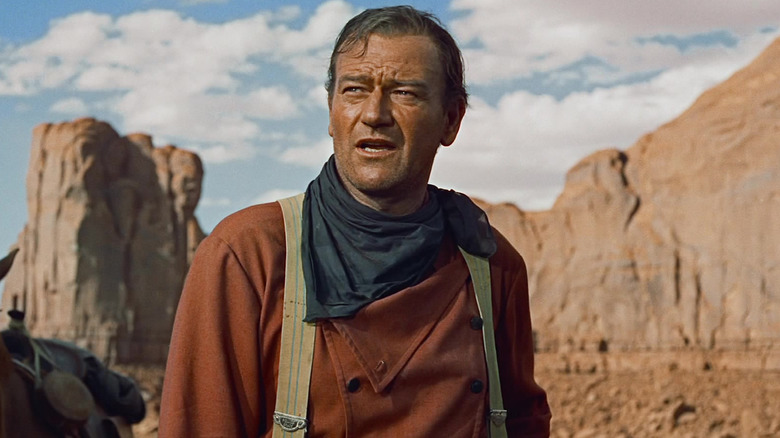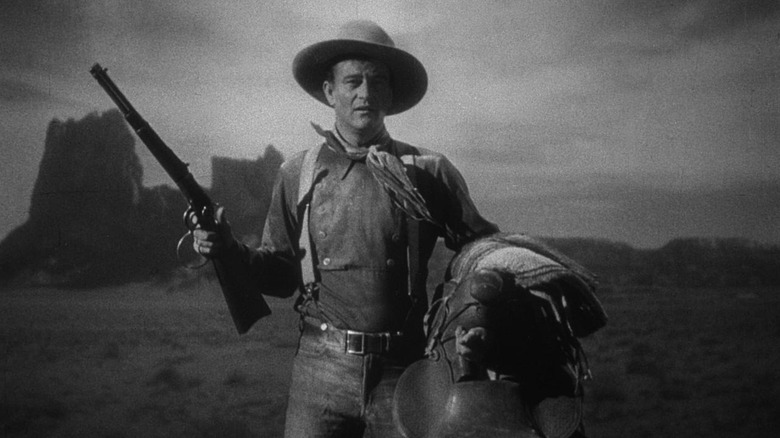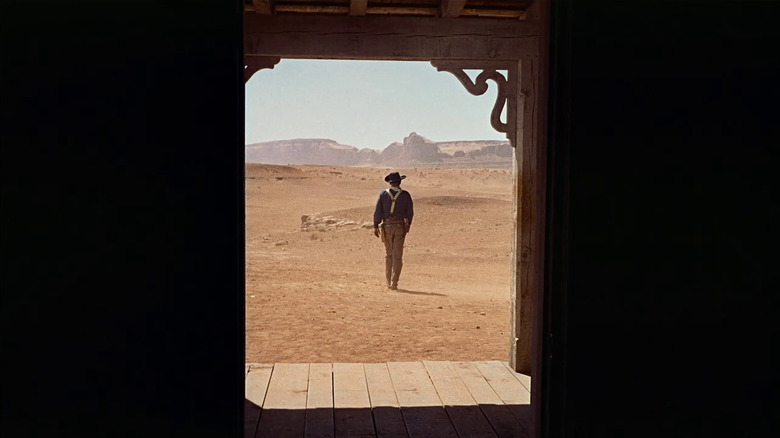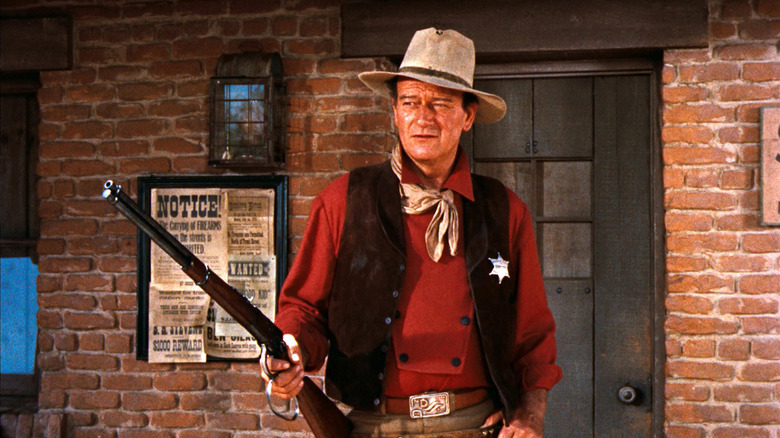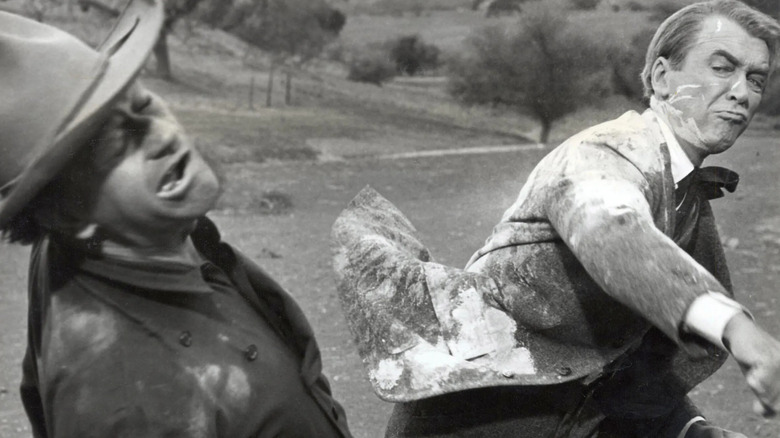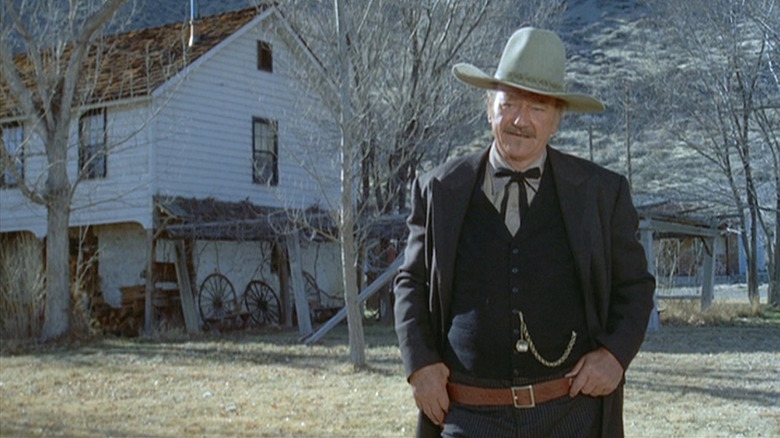The 5 Best John Wayne Movies That Are Streaming For Free
Let's get this out of the way from the start: John Wayne was a problematic figure, and he is reviled in some quarters for his track record of bigoted views and Commie-bashing during the Red Scare. However, there is little denying that the Duke was a true Hollywood legend and one of the most memorable actors in the history of cinema. Over 45 years since he passed away, Wayne is still one of the first names that spring to mind when we think about Western movies, and rightly so. But he also transcended the genre that made him a superstar, standing alongside the likes of Charlie Chaplin, Mickey Mouse, and Marilyn Monroe as an icon of the 20th Century.
Like many modern viewers, I didn't know a ton about Wayne until quite recently when I started writing about his movies for /Film; as a progressive type, I felt an aversion towards him due to all the unsavory stories that have tarnished his legacy. I had to put my feelings aside and try to separate the art from the artist, and now I genuinely appreciate his work in cinema. He was a magnificent presence who could dominate a film with his aura while also helping his co-stars shine, and he was awesome on the screen: At 6 feet 4 inches tall, his bulk always seems to fill the frame and cameras evidently just loved looking at him.
Born Marion Robert Morrison in 1907, Wayne started out as a prop boy for John Ford on various Tom Mix Westerns before gradually carving out a career of his own, mostly with bit parts before getting his first lead role in Raoul Walsh's "The Big Trail" in 1930 (which was the first movie where he was billed by his screen name, "John Wayne"). Over the course of 50 years, Wayne appeared in over 170 films, most famously Westerns but also classic war movies like 1949's "Sands of Iwo Jima" and 1962's "The Longest Day," in addition to popping up in romantic dramas such as John Ford's 1952 version of "The Quiet Man" and playing a Roman Centurion in 1965's "The Greatest Story Ever Told." Whether you're a long-time fan or a newcomer to Wayne's movies, there are currently plenty to choose from for free on an assortment of streaming platforms. Here are five of the best.
Stagecoach (1939)
It's one of Hollywood's greatest screen entrances. Almost 20 minutes into John Ford's "Stagecoach," the titular vehicle is brought to a halt by a single gunshot and the camera zooms in on John Wayne as the Ringo Kid, twirling his Winchester and standing monolithic against the backdrop of Monument Valley. This was where it all began for the Duke after patiently paying his dues in over 80 pictures, grabbing his belated big break and leaping from capable player in B-movie Westerns to a superstar.
The plot of "Stagecoach" is pretty straightforward, following a group of stock characters as the make a perilous journey across the wide open spaces of Arizona while Geronimo and his Apache warriors are on the warpath. These archetypes are played by a terrific group of familiar faces: Among them is Claire Trevor as a sex worker with a heart of gold; a gentleman gambler (John Carradine); a drunken doctor (Thomas Mitchell); and a cowardly, squeaky-voiced coach driver (Andy Devine). On the run from the law, Ringo is taken into custody by the Marshal (George Bancroft) accompanying the trip, but it inevitably falls to the big-hearted outlaw to save his fellow passengers from the marauding warriors.
What makes "Stagecoach" stand out from lesser "cowboys and Native Americans" Western movies is the length of time Ford takes setting up the main characters and the dynamics within their group. We're in safe hands with such a dependable cast, so we actually care who's going to make it once the arrows start flying. The film then builds up to its celebrated chase sequence, which is still thrilling all these years later thanks to some death-defying stunt work.
Sure, "Stagecoach" is problematic in the way it portrays Indigenous Americans as a faceless horde, but otherwise, its classic status remains undiminished; it kickstarted a golden era for the Western genre and became a touchstone for other filmmakers. It even inspired "Citizen Kane," as Orson Welles screened in on repeat to study Ford's editing style, while Ford himself influenced many other directors including Akira Kurosawa, Sergio Leone, and, famously, Steven Spielberg. "Stagecoach" may look a little old hat at times, but it's a fascinating landmark in cinema history as well as a rousing adventure in its own right. It is currently streaming for free on Hoopla, Plex, and other platforms.
The Searchers (1956)
John Wayne and John Ford made 14 pictures together, and "The Searchers" is the darkest of them all. Loosely based on historical events, it was the film that flipped the Duke's screen image on its head. Whereas he'd previously represented good old-fashioned American virtues with his heroic and morally upstanding characters, those values curdled into something far more bitter as he portrayed Ethan Edwards, a confederate soldier who embarks on an obsessive quest to track down his niece Debbie (played by Natalie Wood as a grown-up) after she is abducted as a child by Comanches. As the years drag on, Edwards' motives evolve into something more murderous: driven by his virulent hatred of Indigenous Americans, he would rather see the young woman dead than defiled by Comanche "bucks."
Due to the time period, "The Searchers" necessarily skirted the real-life issue of sexual assault suffered by women captured by natives in the 19th century, but the subject is the crux of the movie. In Edwards' eyes, Debbie's violation by the Comanche men makes her less than human, and he believes her death would be almost an honor killing. It's a powerful performance by Wayne, which presents a conundrum for a viewer with knowledge of the actor's racist views in real life: How much of Edwards' bigotry comes from the character, and how much from the star himself?
As for Ford, "The Searchers" showed maturity and self-awareness from a director who had been guilty of vilifying Indigenous Americans as heartless "savages" in the past, using Edwards' odyssey to provide a more nuanced critique of genocide and Manifest Destiny. It was perhaps the first truly great Revisionist Western, one that countered Ford's trademark vistas and epic sweep with its tough subject matter, troublesome gray areas, mournful tone, and a genuinely contemptible protagonist. And with that final shot of Edwards framed in a homestead doorway as he walks away across the sparse landscape, Ford bade a poignant farewell to the classic romanticized vision of the Old West. The film is currently available on a free trial offer with YouTube TV.
Rio Bravo (1959)
It's fair to say that John Wayne hated Fred Zinnemann's classic "High Noon;" the Duke called it the most un-American thing he'd ever seen and did his best to run its screenwriter, Carl Foreman, out of the United States. Howard Hawks wasn't much of a fan either, comparing Gary Cooper's noble sheriff to a headless chicken and thinking it unbecoming of a Western hero for a woman to save his butt at the end. With similar viewpoints, Hawks and Wayne clubbed together to make "Rio Bravo," a throwback to traditional ideals of bravery, loyalty, courage under fire, and banding together in the face of a common enemy.
If all that makes "Rio Bravo" sound a bit heavy-going, don't worry: It's a fun film that Quentin Tarantino once called "one of the great hangout movies." The action kicks off when Sheriff John T. Chance (Wayne) comes to the aid of his drunken deputy, Dude (Dean Martin), as he is suffering humiliation in a saloon at the hands of Nathan Burdette (John Russell). Burdette kills an innocent bystander in the ensuing brawl and Chance hauls him off to jail. Burdette's big brother is not happy, however, and hires a gang of badasses to spring Nathan from his cell. Holed up in the jail, Chance and Dude can only count an eccentric old timer (Walter Brennan), a baby-faced gunfighter (Ricky Nelson), and a spirited widow (Angie Dickinson) as allies before backup arrives.
Clocking in at well over two hours, much of the pleasure of "Rio Bravo" is derived from the time we get to spend with the characters. Thankfully, they're a charming bunch orbiting Wayne's indomitable screen presence. He's wiser and more mellow a few years after his intense turn in "The Searchers," amiably stepping back when the moment calls for him to let his co-stars make the most of their screen time. The supporting cast are all very good, but the movie really crackles whenever Wayne shares a scene with Martin. The crooner provides the film's outstanding performance, shedding his light-weight image to play a man determined to beat alcoholism and regain the respect of his community. In truth, the film fizzles out towards the end because the final showdown seems unreasonably stacked in favor of the good guys, but "Rio Bravo" still stands as one of Wayne's best Westerns. It's currently streaming for free on Fawesome TV.
The Man Who Shot Liberty Valance (1962)
Over the course of his career, John Ford did perhaps more than any other filmmaker to chronicle the American frontier and shape how cinema-goers viewed the Old West. During that time, he also did quite a bit of his own myth-making, and he brought it all together with "The Man Who Shot Liberty Valance," one of the most perceptive and intelligent movies ever made about that period of the nation's history.
Unfolding largely in flashbacks, the film tells the story of Ransom Stoddard (James Stewart), an idealistic attorney from the east coast determined to bring law and order to the unincorporated territory town of Shinbone. From his first arrival by stagecoach, Stoddard makes an enemy of Liberty Valance (Lee Marvin), a vicious bandit whose rancher employers want things to stay just the way they are. In the middle is Tom Doniphon (John Wayne), a rugged cowboy who believes in the individualistic old ways but nevertheless allies himself to Stoddard's cause.
Handsomely shot in black-and-white when Technicolor was more in vogue for Hollywood Westerns, "The Man Who Shot Liberty Valance" has all the usual tropes like tense standoffs, shootouts, romance, and a little comic relief (I love Andy Devine as the cowardly sheriff), but it's also an insightful study into how democracy works for the people and moves society forward. Time has cast Ford and Wayne as deeply conservative figures, but "The Man Who Shot Liberty Valance" is a remarkably progressive film that champions free speech, free elections, education, equality, gun control, and modernity. As such, it still has plenty to say more than 60 years later, and it's no wonder IMDb voters have ranked it as John Wayne's best Western.
"Liberty Valance" is also a powerful elegy for the Old West that served as a stepping stone to the more cynical Revisionist Westerns of the mid-to-late '60s and early '70s. It was Ford's last Western movie with Wayne and his penultimate entry in the genre (followed by "Cheyenne Autumn" a few years later), and it's tinged with a certain nostalgia for the old days. Without spoiling too much, Stoddard accomplishes great things, yet he is only remembered for his encounter with the titular character, and Tom Doniphon's fate is a fittingly poignant way for the Duke to sign off his run of Westerns with his most celebrated director. The film is currently available on a free trial with MGM+.
The Shootist (1976)
When John Wayne received his first and only Oscar for "True Grit," it was maybe one of those occasions when the Academy makes up for previous oversights by handing a screen legend a belated award. Don't get me wrong, the Duke is very good as one-eyed ex-Marshal Rooster Cogburn, but it's a pretty broad performance. If the Academy had waited a few more years, though, it would have found a far more deserving turn in "The Shootist," Wayne's final film.
Released 50 years after Wayne's first screen appearance, Don Siegel's quiet and melancholy film was a fitting send-off for the star who had helped carry the Western genre across the decades. By that stage, Siegel's regular muse Clint Eastwood had taken over from Wayne as many people's favorite Western movie actor, while "The Shootist" itself was also something of a throwback to a time before Sergio Leone's "Dollars Trilogy" and revisionist Westerns like "The Wild Bunch" had made the classic horse opera seem like old news.
In other ways, "The Shootist" prefigured Eastwood's "Unforgiven" by granting its star a chance to confront his own screen legacy. Wayne plays J.B. Books, an aging and ailing former gunslinger looking for a quiet place to die after he is diagnosed with terminal cancer by his old friend Doc Hostetler (James Stewart). He finds suitable refuge at the boarding house of Bond Rogers (Lauren Bacall), a stern widower who is none too pleased to learn she has a killer living under her roof, much less that her son Gillom (Ron Howard) idolizes the man. However, Books soon discovers that he can't leave his past behind and, with only weeks to live, arranges a final shootout rather than succumb to his illness.
Wayne himself was suffering from poor health when he starred in "The Shootist," and he never looked so weary and vulnerable, his own reckoning with mortality surely informing his tender performance. "I'm a dying man scared of the dark," Books confesses to Bond, and there is a raw honesty to how Wayne delivers that line — he passed away from stomach cancer just three years later. It's not an action-packed film by any means, but Books' final blaze of glory was a fitting way for the screen legend to bow out. The movie is currently streaming for free on Kanopy with a library membership.
